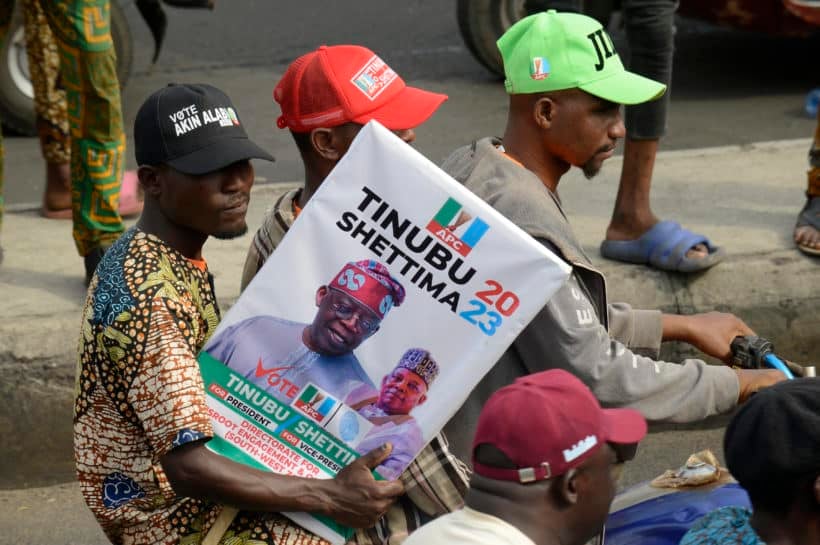
ABUJA, Feb 27 (Reuters) – Nigeria’s ruling party candidate Bola Tinubu was ahead in the vote count after Saturday’s presidential poll, a Reuters tally of provisional results in 20 of 36 states showed on Monday, but opposition parties walked out of the counting process citing concerns of fraud.
The tally of provisional electoral commission results showed Tinubu, of the ruling All Progressives Congress (APC) party, was ahead with 39.7% or 5.4 million of valid votes counted, against 32.2% or 4.4 million votes for Atiku Abubakar of the main opposition People’s Democratic Party (PDP).
Outsider Peter Obi of the smaller Labour Party was in third place on about 16.3% with about 2.2 million.
The election has been fraught with logistical and technological difficulties that resulted in the failure, in many places, to upload results directly from each polling unit to its website, as the Independent National Electoral Commission (INEC) had promised to do to guarantee transparency.
There is no legal requirement to do so, but the failure of the electoral commission to live up to its promise meant results had to be collated manually inside ward and local government counting centres as in previous polls.
“INEC’s lack of efficient planning in critical stages and effective public communication reduced trust in the process,” the European Union observer mission said in a statement.
Commonwealth observer mission chief Thabo Mbeki also criticised INEC for its failure to upload the results.
By 1700 GMT on Monday, INEC had uploaded results from just 66,167 polling units out of a total of 178,846, its website showed.
“We take full responsibility for the problems and regret the distress that they have caused the candidates, political parties and the electorate,” the commission said in a statement.
Opposition parties remained unsatisfied.
“The electoral process has been rigged … and we are completely disassociating ourselves from it,” PDP Atiku’s campaign manage Melaye Dino said at the INEC results centre in Abuja. Obi’s Labour party was equally scathing.
“We regret to say that we have lost confidence in the results being collated and announced,” Akin Oshintokun, director of Obi’s campaign, told reporters. “We hereby call on the INEC to … follow its own guidelines or completely cancel the entire election.”
TECH WOES
The election was highly dependent on communications technology that may have seemed doomed to fail in a country with such poor internet coverage, and the failures open the way for legal challenges against the results.
Obi defeated his ruling party challenger to win Nigeria’s commercial hub of Lagos in a major upset in the poll which was marred by delays and complaints of irregularities.
Around two-thirds of states in Africa’s most populous country have yet to declare.
But the win in Lagos state – with 582,454 votes against 572,606 for Tinubu – was a major boost for Obi, whose run challenged candidates from two long-established movements that have alternated in power since the end of army rule in 1999.
Obi’s campaign grabbed headlines with its use of social media and its focus on young people and urban voters fed up with widespread corruption and insecurity.
To become president, a candidate needs to get more votes than any other candidate and also garner a quarter of the votes in at least 24 states.
There have been reports of violence and intimidation, though not at the scale of previous elections.
In northern Kano state, police said a group had attacked a campaign office for a smaller opposition party and set the building on fire, killing two people.
Police said they had killed one of the attackers and arrested four suspects.
(Additional reporting by Hamza Ibrahim in Kano, Ahmed Kingimi in Maiduguri, Anamesere Igboeroteonwu in Onitsha, Tim Cocks in Lagos, Felix Onuah and Camillus Eboh in Abuja; Writing by Tim Cocks; Editing by Stephen Coates)

